新概念英语第一册lesson85-86重点解析
(完整版)新概念英语第一册lesson85-86重点解析
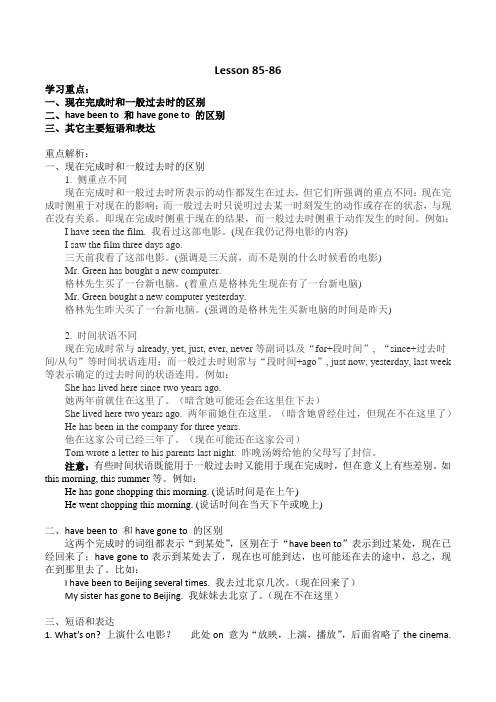
Lesson 85-86学习重点:一、现在完成时和一般过去时的区别二、have been to 和have gone to 的区别三、其它主要短语和表达重点解析:一、现在完成时和一般过去时的区别1. 侧重点不同现在完成时和一般过去时所表示的动作都发生在过去,但它们所强调的重点不同:现在完成时侧重于对现在的影响;而一般过去时只说明过去某一时刻发生的动作或存在的状态,与现在没有关系。
即现在完成时侧重于现在的结果,而一般过去时侧重于动作发生的时间。
例如:I have seen the film. 我看过这部电影。
(现在我仍记得电影的内容)I saw the film three days ago.三天前我看了这部电影。
(强调是三天前,而不是别的什么时候看的电影)Mr. Green has bought a new computer.格林先生买了一台新电脑。
(着重点是格林先生现在有了一台新电脑)Mr. Green bought a new computer yesterday.格林先生昨天买了一台新电脑。
(强调的是格林先生买新电脑的时间是昨天)2. 时间状语不同现在完成时常与already, yet, just, ever, never等副词以及“for+段时间”, “since+过去时间/从句”等时间状语连用;而一般过去时则常与“段时间+ago”, just now, yesterday, last week 等表示确定的过去时间的状语连用。
例如:She has lived here since two years ago.她两年前就住在这里了。
(暗含她可能还会在这里住下去)She lived here two years ago. 两年前她住在这里。
(暗含她曾经住过,但现在不在这里了)He has been in the company for three years.他在这家公司已经三年了。
(现在可能还在这家公司)Tom wrote a letter to his parents last night. 昨晚汤姆给他的父母写了封信。
新概念课堂笔记 第一册 Lesson 85-86
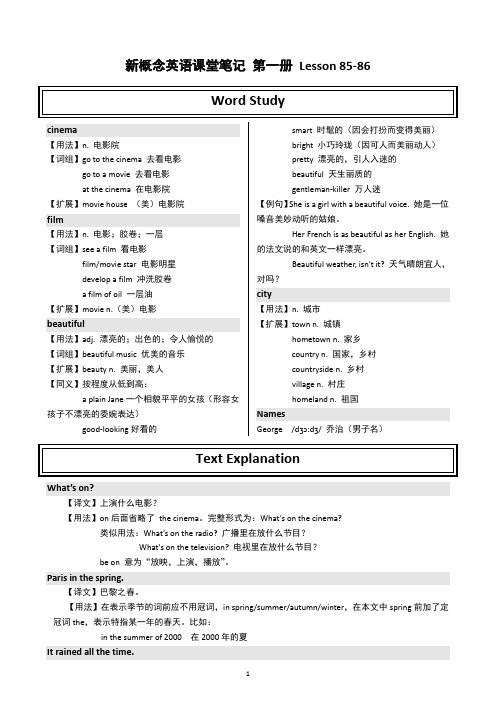
新概念英语课堂笔记第一册Lesson 85-86cinema【用法】n. 电影院【词组】go to the cinema 去看电影go to a movie 去看电影at the cinema 在电影院【扩展】movie house (美)电影院film【用法】n. 电影;胶卷;一层【词组】see a film 看电影film/movie star 电影明星develop a film 冲洗胶卷a film of oil 一层油【扩展】movie n.(美)电影beautiful【用法】adj. 漂亮的;出色的;令人愉悦的【词组】beautiful music 优美的音乐【扩展】beauty n. 美丽,美人【同义】按程度从低到高:a plain Jane一个相貌平平的女孩(形容女孩子不漂亮的委婉表达)good-looking好看的smart 时髦的(因会打扮而变得美丽)bright 小巧玲珑(因可人而美丽动人)pretty 漂亮的,引人入迷的beautiful 天生丽质的gentleman-killer 万人迷【例句】She is a girl with a beautiful voice. 她是一位嗓音美妙动听的姑娘。
Her French is as beautiful as her English. 她的法文说的和英文一样漂亮。
Beautiful weather, isn't it? 天气晴朗宜人,对吗?city【用法】n. 城市【扩展】town n. 城镇hometown n. 家乡country n. 国家,乡村countryside n. 乡村village n. 村庄homeland n. 祖国NamesGeorge /dʒɔ:dʒ/ 乔治(男子名)What’s on?【译文】上演什么电影?【用法】on后面省略了the cinema。
完整形式为:What’s on the cinema?类似用法:What’s on the radio? 广播里在放什么节目?What's on the television? 电视里在放什么节目?be on 意为“放映,上演,播放”。
新概念英语第一册第85-86课-Paris-in-the-Spring

新概念英语第一册第85-86课:Paris in the Spring Lesson 85 Paris in the spring巴黎之春Listen to the tape then answer this question.At what time of year did Ken visit Paris?听录音,然后回答下列问题。
肯是在什么季节访问巴黎的?George: Hello, Ken.乔治:你好,肯。
Ken: Hello, George.肯:你好,乔治。
George: Have you just been to the cinema?乔治:你刚去过电影院吗?Ken: Yes, I have.肯:是的,我刚去过。
George: Whats on?乔治:上映什么片子?Ken: “Paris in the Spring”.肯:《巴黎之春》。
George: Oh, Ive already seen it.I saw it on television last year. Its an old film, but its very good.乔治:噢,我已看过了。
我是去年在电视上看的。
这是老部片子,但很好。
Ken: Paris is a beautiful city.肯:巴黎是座秀丽的城市。
George: I have never been there. Have you ever been there, Ken?乔治:我从未去过。
肯,你去过吗?Ken: Yes, I have. I was there in April.肯:是的,我去过。
4月份我在那儿。
George: Paris in the spring, eh?乔治:那是巴黎之春,是吗?Ken: It was spring, but the weather was awful. It rained all the time.肯:是春天,但天气太糟了。
新概念一Lesson85-86讲义doc
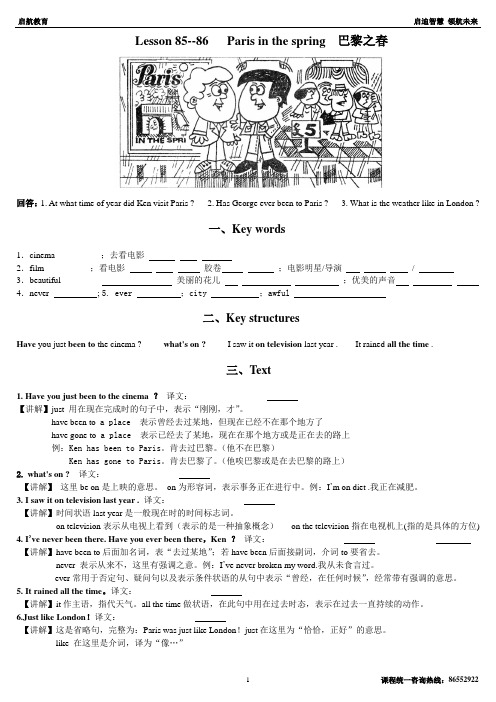
Lesson 85--86 Paris in the spring 巴黎之春回答:1. At what time of year did Ken visit Paris ? 2. Has George ever been to Paris ? 3. What is the weather like in London ?一、Key words1.cinema __________;去看电影2.film __________;看电影胶卷;电影明星/导演/3.beautiful _________ 美丽的花儿;优美的声音4.never ; 5. ever ;city ;awful二、Key structuresHave you just been to the cinema ? what's on ? I saw it on television last year . It rained all the time .三、Text1. Have you just been to the cinema ?译文:_________________ _________________【讲解】just 用在现在完成时的句子中,表示“刚刚,才”。
have been to a place 表示曾经去过某地,但现在已经不在那个地方了have gone to a place 表示已经去了某地,现在在那个地方或是正在去的路上例:Ken has been to Paris。
肯去过巴黎。
(他不在巴黎)Ken has gone to Paris。
肯去巴黎了。
(他唉巴黎或是在去巴黎的路上)2. what's on ? 译文:_________________ __【讲解】这里be on是上映的意思。
on为形容词,表示事务正在进行中。
例:I’m on diet .我正在减肥。
3.I saw it on television last year .译文:_________________ _________________【讲解】时间状语last year是一般现在时的时间标志词。
新概念英语第一册自学笔记含课后练习答案:Lesson 85-86
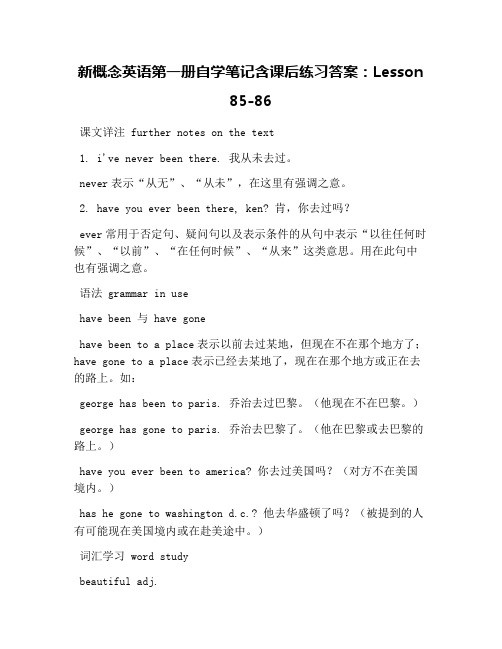
新概念英语第一册自学笔记含课后练习答案:Lesson85-86课文详注 further notes on the text1. i've never been there. 我从未去过。
never表示“从无”、“从未”,在这里有强调之意。
2. have you ever been there, ken? 肯,你去过吗?ever常用于否定句、疑问句以及表示条件的从句中表示“以往任何时候”、“以前”、“在任何时候”、“从来”这类意思。
用在此句中也有强调之意。
语法 grammar in usehave been 与 have gonehave been to a place表示以前去过某地,但现在不在那个地方了;have gone to a place表示已经去某地了,现在在那个地方或正在去的路上。
如:george has been to paris. 乔治去过巴黎。
(他现在不在巴黎。
)george has gone to paris. 乔治去巴黎了。
(他在巴黎或去巴黎的路上。
)have you ever been to america? 你去过美国吗?(对方不在美国境内。
)has he gone to washington d.c.? 他去华盛顿了吗?(被提到的人有可能现在美国境内或在赴美途中。
)词汇学习 word studybeautiful adj.(1)美丽的,使生美感的:she was even more beautiful than i had expected. 她甚至比我预期的还要美。
she's a girl with a beautiful voice. 她是一位嗓音美妙动听的姑娘。
(2)出色的,完美的;令人愉悦的:her french is as beautiful as her english. 她的发文说得和英文一样漂亮。
he did a beautiful job of painting the desk. 他油漆了书桌,活干得很漂亮。
新概念英语第一课 Lesson 85-86

NCE Lesson 85-86课文详解1.I've never been there. 我从未去过。
never 表示“从无”、“从未”,在这里有强调之意。
2.Have you ever been there, Ken? 肯,你去过吗?ever常用于否定句、疑问句以及表示条件的从句中表示“以往任何时候”、“曾经”、“在任何时候”、“从来”这类意思。
用在此句中也有强调之意。
3.What’s on ? 上映什么片子?be on 上演,放映,on为形容词,表示事物正在进行中。
如: There’s a new film on at the cinema .电影院正在上映一部新电影。
语法 Grammar in use have been与have gonehave been to a place表示曾经去过某地,但现在不在那个地方了;have gone to a place表示已经去某地了,现在在那个地方或正在去的路上。
如:George has been to Paris. 乔治去过巴黎。
(他现在不在巴黎。
)George has gone to Paris. 乔治去了巴黎。
(他在巴黎或去巴黎的路上。
)Have you ever been to America?你去过美国吗?(对方不在美国境内。
)Has he gone to Beijing? 他去北京了吗?(被提到的人有可能现在在北京或在赴北京途中。
)一、写出下列单词的过去式和过去分词。
1.be __________2.do ___________ __________3.have ___________ __________4.see ___________ __________5.air ___________ __________6.open ___________ __________7.buy __________ __________ 8.put __________ __________ 9.go ________ ___________二、句型转换。
(完整版)新概念英语第一册lesson85-86重点解析

Lesson 85-86学习重点:一、现在完成时和一般过去时的区别二、have been to 和have gone to 的区别三、其它主要短语和表达重点解析:一、现在完成时和一般过去时的区别1. 侧重点不同现在完成时和一般过去时所表示的动作都发生在过去,但它们所强调的重点不同:现在完成时侧重于对现在的影响;而一般过去时只说明过去某一时刻发生的动作或存在的状态,与现在没有关系。
即现在完成时侧重于现在的结果,而一般过去时侧重于动作发生的时间。
例如:I have seen the film. 我看过这部电影。
(现在我仍记得电影的内容)I saw the film three days ago.三天前我看了这部电影。
(强调是三天前,而不是别的什么时候看的电影)Mr. Green has bought a new computer.格林先生买了一台新电脑。
(着重点是格林先生现在有了一台新电脑)Mr. Green bought a new computer yesterday.格林先生昨天买了一台新电脑。
(强调的是格林先生买新电脑的时间是昨天)2. 时间状语不同现在完成时常与already, yet, just, ever, never等副词以及“for+段时间”, “since+过去时间/从句”等时间状语连用;而一般过去时则常与“段时间+ago”, just now, yesterday, last week 等表示确定的过去时间的状语连用。
例如:She has lived here since two years ago.她两年前就住在这里了。
(暗含她可能还会在这里住下去)She lived here two years ago. 两年前她住在这里。
(暗含她曾经住过,但现在不在这里了)He has been in the company for three years.他在这家公司已经三年了。
(现在可能还在这家公司)Tom wrote a letter to his parents last night. 昨晚汤姆给他的父母写了封信。
新概念英语第一册Lesson85-86(ok)

lesson85
Paris in the spring巴黎之春
Eiffel Tower
The Eiffel Tower a famous landmark in Paris
Arch de Triomphe
Arch de Triomphe is to honour a victory in war.
★never adv . 从来没有 频率副词 never(0%),seldom(20%),sometimes(40%), often(60%),usually(80%),always(100%) (1)通常用于一般动词之前,be动词,助动词之后。 I never had a chance to meet him. 我始终没有机会与他见面。 (2)用于命令句之首。 Never eat too much. 不要吃得太多. Never mind 不必介意
现在完成时的时间状语
• ever 曾经 • never从不
nerver & ever
Never 决不, 从不 I will never forget your kindness. 我永远忘不了你的好意。
ever 曾经,永远,究竟 Have you ever been to Paris? 你去过巴黎吗? 我们会被允许吗? Could we ever get permission?
• • • • •
我爸爸去了香港 My father has gone to H.K.. 我爸爸去过香港 My father has been to H.K.. 我爸爸只有45岁,但是几乎世界上的 所有国家他都去过。 • My father is only 45 years old. But he has already been to nearly every country in the world.
新概念英语第一册Lesson85-86笔记(语法点+配套练习+答案)
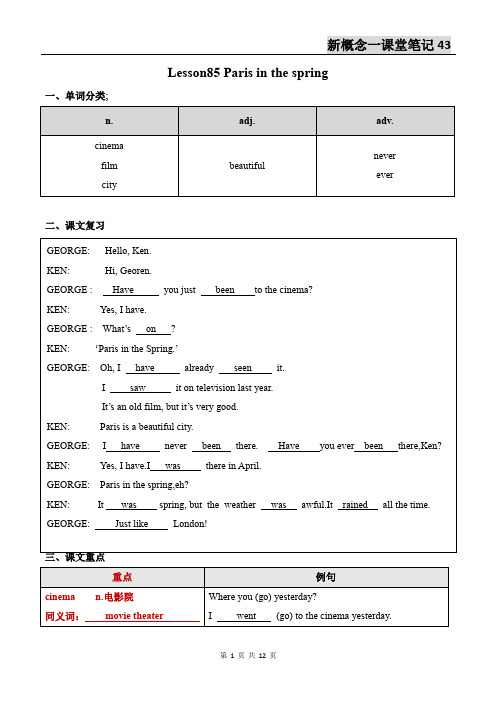
3. Mr. Wang has taught in this schoolforten years.
4.‘Have youeverseen the film?’
‘No, I haveneverseen it.’
5.‘Has the bus leftyet?
‘Yes, it hasjustleft.’
2.过去分词的规则变化:
ABB
原形
过去式
过去分词
原形
过去式
过去分词
通风
air
aired
aired
跳舞
dance
danced
danced
玩
play
played
played
购物
shop
shopped
shopped
变得
Thebeautywho wears abeautifuldress dancesbeautifully.
What abeautiful(beautiful, beautifully) castle!
Howbeautifully(beautiful, beautifully) those birds sing!
Where you (go) yesterday?
Iwent(go) to the cinema yesterday.
Ihave been(be) to the cinema only once.
I likegoing(go) to the cinemato see(see) movies.
How aboutgoing(go) to the movie theater?
新概念英语第一册Lesson85-86课件(共43页)解析
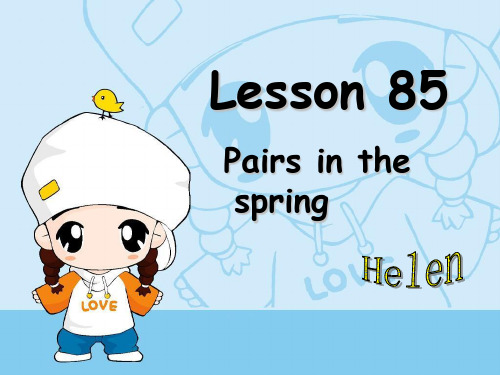
nerver & ever
never 决不, 从不
ever 曾经,永远,究竟
I will never forget your kindness. 我永远忘不了你的好意。
Have you ever been to Paris? 你去过巴黎吗?
活到老,学到老。
even been there,Ken?
KEN: Yes, I have.I _w_a_s__t_he_r_e in April.
GEORGE: Paris in the spring,eh?
KEN: It was spring, but the weather was aw
ful.It
rained
all
the
time.
GEORGE: __J_u_st__li_k_e_____ London!
三,词汇学习
英国妈妈是这样教宝贝说话的~~~
如果你是宝贝,能理解妈妈的话吗,能照妈 妈的话做吗?Hey, babe~~~
英国妈妈是这样教宝贝说话的~~~
Hey, babe~~~, try to write it down:
我们会被允许吗?
One is never too old to learn. Could we ever get permission?
GEORGE: Hello, Ken. just刚刚,刚才 KEN: Hi, George.
GEORGE: Have you just been to the
cinema?
Lesson 85 Paris in thespring
★ beNaeuwtifuwl oarddj.s漂a亮nd的expressions:
新概念第一册Lesson85-86

现在完成时VS一般过去时
The Eiffel Tower(埃菲尔铁塔),
The Eiffel Tower(埃菲尔铁 塔), which is 320 meters high, is the symbol of Paris. It was completed in 1889.
(2) 现在完成时由 主语+have/has+ 过去分词, 单数第3人称用has,其他人称皆用have。 规则动词的过去分词与过去式相同,而不规 则
动词的过去分词则需特别加以记忆。
动词的过去分词的规则变化规则:
• ①原形+ed 如:worked, passed • ②词尾是e时,直接加d 如:liked lived • ③若词尾为“辅音字母加y”,则改y为i加ed。
(movie theater<美语>电影院) • go to the cinema(英) • go to the theater(美)
去看电影
★ film [fɪlm] n. 电影;胶卷
(1)n. 电影
film 艺术影片 movie 好莱坞商 业片
a film star 电影明星 see the film 看电影
(4)already & yet
1.already “已经”,用于肯定、疑问句; 2.yet 用于疑问、否定句的句尾,含有“仍然” “还没有”之意。 Have you done it already?
Yes, I have already done it. Haven’t you done it yet?
320米高的埃费尔 铁塔是巴黎的标志。 它建于1889年. 埃菲 尔铁塔是巴黎的标志 之一,被法国人爱称 为“铁娘子”。它和 纽约的帝国大厦、东 京的电视塔同被誉为 西方三大著名建筑。
新概念英语Lesson 85-86讲义
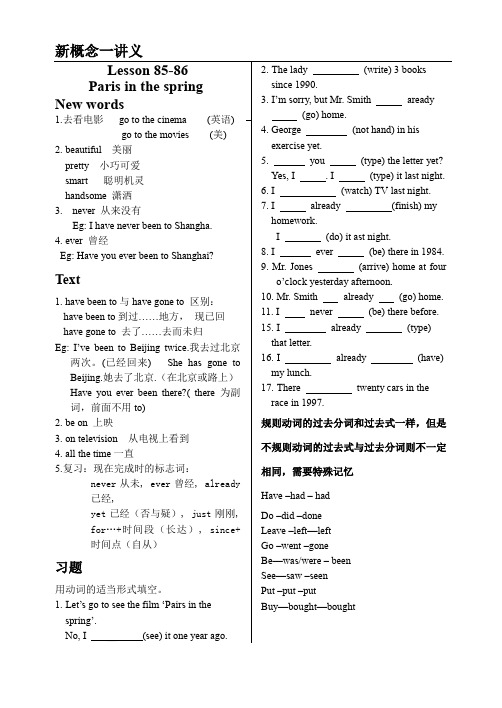
新概念一讲义Lesson 85-86Paris in the springNew words1.去看电影go to the cinema (英语)go to the movies (美) 2. beautiful 美丽pretty 小巧可爱smart 聪明机灵handsome 潇洒3.never 从来没有Eg: I have never been to Shangha.4. ever 曾经Eg: Have you ever been to Shanghai? Text1. have been to与have gone to 区别:have been to到过……地方,现已回have gone to 去了……去而未归Eg: I’ve been to Beijing twice.我去过北京两次。
(已经回来) She has gone to Beijing.她去了北京.(在北京或路上)Have you ever been there?( there 为副词,前面不用to)2. be on 上映3. on television 从电视上看到4. all the time一直5.复习:现在完成时的标志词:never从未, ever曾经, already已经,yet已经(否与疑), just刚刚,for…+时间段(长达), since+时间点(自从)习题用动词的适当形式填空。
1.Let’s go to see the film ‘Pairs in the spring’.No, I __ (see) it one year ago. 2.The lady (write) 3 books since 1990.3.I’m sorry, but Mr. Smith aready(go) home.4. George (not hand) in his exercise yet.5. you (type) the letter yet? Yes, I . I (type) it last night.6. I (watch) TV last night.7. I already (finish) my homework.I (do) it ast night.8. I ever (be) there in 1984.9. Mr. Jones (arrive) home at fouro’clock yesterday afternoon.10. Mr. Smith already (go) home.11. I never (be) there before.15. I already (type) that letter.16.I already (have) my lunch.17.There twenty cars in the race in 1997.规则动词的过去分词和过去式一样,但是不规则动词的过去式与过去分词则不一定相同,需要特殊记忆Have –had – hadDo –did –doneLeave –left—leftGo –went –goneBe—was/were – beenSee—saw –seenPut –put –putBuy—bought—bought。
新概念一85-86课详解

Lesson 85二选择( B )1. Your father has been to Guangzhou twice, ______?A. has heB. hasn't heC. doesn't he详解:你的父亲已经到过广州两次,不是吗?反意疑问句:前肯后否。
前面是助动词has.( A )2.---Where is Mrs. Smith?---She isn't here. She ____ to England.A. has goneB. has beenC. goes详解:斯密斯夫人在哪里?她不在这里,她已经去英国了。
去了还没有回来使用has gone to ,去了已经回来了用has been to。
( C )3.How about ____ to the cinema on Sunday ?A. goB. to goC. going详解:星期天去电影院如何?介词之后使用动词的ing形式。
( A )4.---Is that Jack speaking?---Sorry, he isn't in right now. He ____ the cinema with his aunt.A. has gone toB. has been toC. have been to详解:杰克在吗?不好意思,他现在不在这里,他跟他的阿姨去电影院,去了还没有回来使用has gone to ,去了已经回来了用has been to。
( A )5.I saw the movie Gone With the Wind ____ television last year.A. onB. inC. with详解:我去年在电视上看了飘这部电影On television,在电视上。
( B )6.I ___ to Canada twice. It's so beautiful.A. won't goB. have been toC. have gone详解:我去过加拿大两次。
新概念英语第一册lesson85-86

KEN: Hi, George.
GEORGE: Have you just been to the
cinema?
KEN:
Yes, I have.
Have you just been to the cinema? 你刚去过电影院吗?
just:刚刚,刚才(通常与完成时连用,有时也 与过去时连用)
eg:We have just arrived=We just arrived.我 们刚刚到。
beon是上演的意思也可理解成在荧幕上是上演的意思也可理解成在荧幕上inspringsummerautumnwinter在季节前不用加任何冠词在季节前不用加任何冠词parisinthespring这指的是一个春天在巴黎发生的事情所以加了定冠词这指的是一个春天在巴黎发生的事情所以加了定冠词ivealreadyseenit
GEORGE: Pairs in the spring, eh? KEN: It was spring, but the weather
was awful. It rained all the time. GEORGE: Just like London!
Language in Use: “Have you just been to…?”.
Jane: Hello, Amy. Amy: Hi, Jane. Jane: Have you just been to the supermarket? Amy: Yes, I have. Jane: What's on sale? …
Text analysis.
GEORGE: Hello, Ken.
in
April
月份前面不用冠词 never与ever都是完成时的标
新概念第一册Lesson85-86知识点及拓展

新概念第一册Lesson85-86知识点及拓展Lesson 85-86Pairs in the springGEORGE: Hello, Ken.KEN: Hi, George.GEORGE: Have you just been to the cinema?KEN: Yes, I have.GEORGE: What’s on?KEN: ‘Paris in the spring’.GEORGE: Oh, I’ve already seen it.I saw it on television last year.It’s an old film, but it’s very good.KEN: Paris is a beautiful city.GEORGE: I’ve never been there.Have you ever been there, Ken?KEN: Yes, I have. I was there in April.GEORGE: Pairs in the spring, eh?KEN: It was spring, but the weather was awful.It rained all the time.GEORGE: Just like London!1. Have you just been to the cinema?1)这是现在完成时的一般疑问句,主语是you,助动词用have.2)just 刚刚,刚才(通常与完成时连用,有时也与过去时连用)--He has just bought a second hand car.--We just arrived.--just “正要…”“刚要….”(常用进行时或be going to do 连用) --I am just making tea for you.--She was just about to fall asleep when the telephone rang. 3)have been to a place表示曾经去过某地,但现在不在那个地方了,去而复归;have gone to a place表示己经去某地了,现在在那个地方或正在去的路上,去而未归。
- 1、下载文档前请自行甄别文档内容的完整性,平台不提供额外的编辑、内容补充、找答案等附加服务。
- 2、"仅部分预览"的文档,不可在线预览部分如存在完整性等问题,可反馈申请退款(可完整预览的文档不适用该条件!)。
- 3、如文档侵犯您的权益,请联系客服反馈,我们会尽快为您处理(人工客服工作时间:9:00-18:30)。
Lesson 85-86
学习重点:
一、现在完成时和一般过去时的区别
二、have been to 和have gone to 的区别
三、其它主要短语和表达
重点解析:
一、现在完成时和一般过去时的区别
1. 侧重点不同
现在完成时和一般过去时所表示的动作都发生在过去,但它们所强调的重点不同:现在完成时侧重于对现在的影响;而一般过去时只说明过去某一时刻发生的动作或存在的状态,与现在没有关系。
即现在完成时侧重于现在的结果,而一般过去时侧重于动作发生的时间。
例如:
I have seen the film. 我看过这部电影。
(现在我仍记得电影的内容)
I saw the film three days ago.
三天前我看了这部电影。
(强调是三天前,而不是别的什么时候看的电影)
Mr. Green has bought a new computer.
格林先生买了一台新电脑。
(着重点是格林先生现在有了一台新电脑)
Mr. Green bought a new computer yesterday.
格林先生昨天买了一台新电脑。
(强调的是格林先生买新电脑的时间是昨天)
2. 时间状语不同
现在完成时常与already, yet, just, ever, never等副词以及“for+段时间”, “since+过去时间/从句”等时间状语连用;而一般过去时则常与“段时间+ago”, just now, yesterday, last week 等表示确定的过去时间的状语连用。
例如:
She has lived here since two years ago.
她两年前就住在这里了。
(暗含她可能还会在这里住下去)
She lived here two years ago. 两年前她住在这里。
(暗含她曾经住过,但现在不在这里了)He has been in the company for three years.
他在这家公司已经三年了。
(现在可能还在这家公司)
Tom wrote a letter to his parents last night. 昨晚汤姆给他的父母写了封信。
注意:有些时间状语既能用于一般过去时又能用于现在完成时,但在意义上有些差别。
如this morning, this summer等。
例如:
He has gone shopping this morning. (说话时间是在上午)
He went shopping this morning. (说话时间在当天下午或晚上)
二、have been to 和have gone to 的区别
这两个完成时的词组都表示“到某处”,区别在于“have been to”表示到过某处,现在已经回来了;have gone to表示到某处去了,现在也可能到达,也可能还在去的途中,总之,现在到那里去了。
比如:
I have been to Beijing several times. 我去过北京几次。
(现在回来了)
My sister has gone to Beijing. 我妹妹去北京了。
(现在不在这里)
三、短语和表达
1. What’s on? 上演什么电影?此处on 意为“放映,上演,播放”,后面省略了the cinema.
What’s on the radio? 广播里在放什么节目?
What’s on the television? 电视里在放什么节目?
2. Paris in the spring 《电影之春》
一般情况下季节名词前不在the, 但如果特指某年的春、夏、秋、冬季时要加the。
《巴黎之春》作为一部电影,讲述的是发生在巴黎某年春天的故事,因此用了in the spring.
3. 句型:What have you/they done? 回答:I/We/They have +动词过去分词+其它.
What has he/she done? 回答:He/She has +动词过去分词+其它.
练习:
一、选择最恰当的答案。
1. ---I have seen the film “Titanic” already.
---When __________ you __________ it?
---The day before yesterday.
A. have; seen
B. will; see
C. did; see
D. did; seen
2. Mr. Black __________ in China since five years ago.
A. lived
B. has lived
C. lives
D. is going to live
3. We ____________ trees last Sunday. So far we __________ over 3,000 trees there.
A. planted; planted
B. planted; have planted
C. have planted; planted
D. have planted; have planted
4. Jim ______ the Great Wall(长城)many times.
A. went to
B. goes to
C. has gone to
D. has been to
5. Miss Wu has taught in this school ______.
A. for ten years
B. ten years ago
C. since ten years
D. for ten years ago
6. I ______ today’s homework already. Wha t about you?
A. have finished
B. finish
C. to finish
D. finishing
二、用所给动词的适当形式填空。
1. Jim ___________(make) many friends since he ______(come) to China.
2. He _______ already ___________(write, wrote, written) a letter to the factory to ask them to stop making noise.
3. —When ______ she _______(leave)?
—Two hours ago.
4. —_______ you _______(see) the film before?
—Yes, I _______.
—Where ______ you ______(see) it?
—At The Queen’s Cinema.
5. How long ______ she _______(be) ill?
三、句型转换。
1. John went to see his grandmother once a week. (对划线部分提问)
_______ ________ _______ John _______ to see his grandmother?
2. He has already finished his homework. (改为否定句)
He ________ finished his homework ________.
3. He has emptied the basket. (对划线部分提问)
_________________________________________________________。
